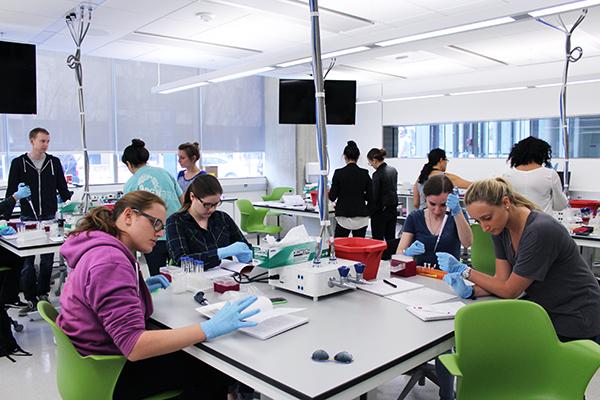Biology majors will soon be able to narrow down their degrees.
The chair of the biology department said he has proposed adding concentrations to the biology major, which could be implemented as early as this fall. Students will be able to choose from one of three concentrations to specialize in based on their interests or career goals, a switch that could better prepare students for postgraduation plans.
Robert Donaldson, the chair of the biology department, said the three proposed concentrations are cell and molecular biology, general biology and ecology, and evolution and environment. He said those different concentrations are clear paths to common postgraduate interests. For example, he said students who concentrate in cell and molecular biology are likely interested in pursuing medical degrees.
Donaldson said the three concentrations would have similar introductory requirements including introductory-level biology, chemistry and physics. Students in different concentrations would not have to take all of the same upper-level courses, which would allow them to focus on the areas they want to pursue within biology after graduation, he said.
“Within those options there are variations on what particular upper-level-type courses students would need to show they have taken and concentrated in that area,” Donaldson said.
Donaldson added that students who are planning to attend medical school after earning their biology degrees would be able to follow a pre-med track within any of the three concentrations.
Donaldson said he and other biology faculty suggested the changes after the American Association for the Advancement of Science and the National Science Foundation both published findings supporting more specific tracks within biology majors to prepare graduates for work they will do in their chosen fields. He said the department hopes to implement the concentrations this fall, but pending approval from administrators may mean this new program could be pushed off until next spring or the fall of 2017.
Randall Packer, a biology professor and the former chair of the department, said the new tracks will allow students to study within their interests sooner, preparing them for a career or their next degree.
“It is more focused on their individual interests, and that will prepare them better for the next stage of their education or to enter the workforce,” Packer said.
Packer added that this change does not impact the courses already being taught or the faculty currently teaching in the department.
Paul Wahlbeck, the vice dean for programs and research in the Columbian College of Arts and Sciences, said officials in the school are “reviewing changes to the biology major,” including the proposed concentrations, and those alterations are “pending final approval.”
Wahlbeck declined to comment on how long officials have been working with the biology department on changing the major, whether the school will hire more faculty members to teach specific classes and if other departments are working on creating majors with tracks based on students’ interests.
Several other universities have embarked on similar changes in their curriculums. Vanderbilt University, one of GW’s peer institutions, recently split their biology major into similar tracks, according to their website.







